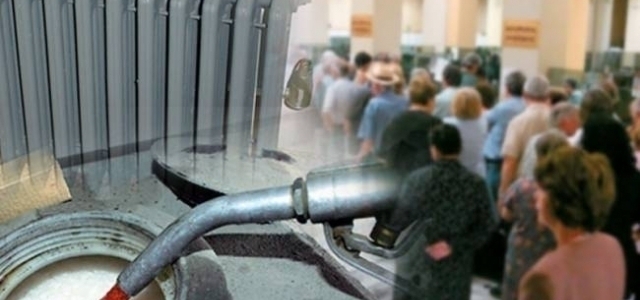
The turnover of the consumption of heating oil in the region of Attica has dropped by 80% this winter season compared to winter 2011-2012. The collapse in demand in northern Greece remains impressive although it is lower than in the southern part of the country. In the northern areas, the decrease in the turnover of the trade of heating oil is in the range of 60% -75% depending on the specifics of the particular place and its geographical location as shown by the data, which George Asmatoglou, the chairman of the Athens union of oil dealers and petrol stations owners, presented to GRReporter.
"The prices of heating oil are unaffordable to the majority of the population after the increase in the excise duty. Regular customers such as block of flats do not order heating oil either," says Asmatoglou. He states that despite the forecast of a cold front, which is expected to spread throughout Greece, there are no new orders yet. "If we make a comparison with the data from previous years, things seem even worse. When the weather forecast is for a drastic drop in temperatures, the phones in the stations start ringing continuously at least two or three days before the cold front. Although the temperature is expected to drop below zero in the region of Attica in the middle of this week, which is unusual for this area, we do not yet have any calls," says he.
The few orders they received at the beginning of the season were greatly reduced in volume. "If a household ordered one ton of heating oil last year, those who venture to buy heating oil this year do not order more than 400 litres," says Asmatoglou. The majority of houses in the capital are being heated by the local heating systems for not longer than two or three hours, mainly in the evenings, when it is assumed that all household members are at home.
Alternative heating sources like electric appliances, air conditioners or heaters and fireplaces are more popular at present. Petrol stations offering firewood are a common phenomenon in the capital already. According to the chairman of the Athens union of oil dealers and petrol stations owners, about 30% of the petrol stations in the region of Attica sell firewood in bags or in bulk. However, they cannot offset the losses of dealers from the reduced demand for traditional heating oil.
The heating crisis that has emerged due to the rise in the price of heating oil has led to another problem, which is the burning of low-quality timber. The Athens Medical Association has urged the government to take immediate measures to subsidize the consumption of heating oil and natural gas by the population in order to reduce the air pollution caused by the particulate matter emitted during the burning of low-quality timber.
There is yet no increase in respiratory problems in the cities where winter smog has appeared. However, the Ministry of Health has formed a scientific working commission to establish the exact impact on the health of citizens from the increased levels of particulate matter in the air. Some analysts in the country say on the other hand that the problem with them is being exaggerated.
Opinions have been heard in recent days according to which giving publicity to the data of increased air pollution from the burning of wood is biased. It aims to put pressure on the government to reduce the excise duty on heating oil or to increase the state subsidy for the purchase of heating oil. The Finance Minister Yiannis Stournaras has made it clear that these scenarios will remain unachievable. He is firm that the government does not avail free funds to offset the losses from the reduction of the excise duty or to give extra welfare benefits for heating and that heating oil prices are not expected to drop.
http://gogreece.about.com/gi/o.htm?zi=1/XJ&zTi=1&sdn=gogreece&cdn=travel&tm=10&f=22&su=p531.60.342.ip_&tt=2&bt=0&bts=0&zu=http%3A//www.grreporter.info/en/

No comments:
Post a Comment